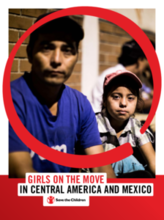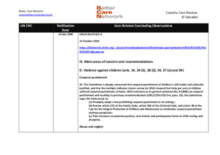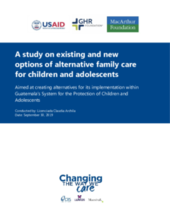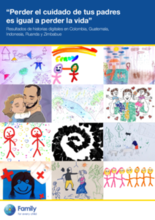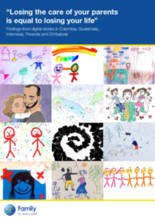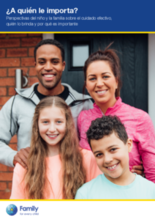Displaying 71 - 80 of 176
Este artículo explora las prácticas institucionales que facilitan u obstaculizan la protección de derechos de niños, niñas y adolescentes en el sistema de protección de la niñez en Honduras a través de sus diferentes etapas.
The primary purpose of this report is to recommend evidencebased strategies to improve the relevance and effectiveness of field interventions that target development outcomes for girls on the move in Central America and Mexico.
In this article, the stories of children left-behind by parental migration in Central America and Mexico are conveyed in their own words detailing how vulnerable they felt when abandoned, confused, and at times, rejected after finally connecting with their long-lost families.
This country care review includes the care related Concluding Observations adopted by the Committee on the Rights of the Child and the Committee on the Rights of Persons with Disabilities as part of its examination of El Salvador's initial reports, as well as other care-related concluding observations, ratification dates, and links to the Universal Periodic Review and Hague Intercountry Adoption Country Profile.
This report from Changing the Way We Care reviews the range of available alternative care options in Guatemala and offers recommendations for additional alternative care modalities as well as deinstitutionalization and family preservation practices.
In the present study, focused on Latin American migrant women, transnational ties are considered a protective factor of family functioning, conditioned by premigratory variables. The working hypothesis is that increased frequency of reunited mothers' communication with and remittances to their children during the period of separation prior to the reunion will be linked to better communication, cohesion, flexibility, satisfaction, and family resources, according to the reunited mothers' perception.
This report explores what family means to children and adults in five countries using the digital storytelling technique.
Pese a que hay un consenso sobre la importancia del cuidado efectivo en las familias para los niños, existe una falta de discusión y acuerdo sobre los componentes precisos de este cuidado. Este informe contribuye a debatir sobre este importante tema al proporcionar perspectivas de los grupos focales con 198 niños y 81 adultos de Brasil, Colombia, Egipto, México, Rusia, Ruanda y Zimbabue.
There is extensive research demonstrating clearly the importance of a safe and caring family for child wellbeing and development. While there is consensus on the importance of effective care in families for children, there is a lack of discussion and agreement about the precise components of this care. This report contributes to debates on the components of family care by providing perspectives from nearly 200 children and over 80 adults from Brazil, Colombia, Egypt, Mexico, Russia, Rwanda and Zimbabwe. The report demonstrates that there are many commonalities in perspectives on and experiences of care across contexts.

